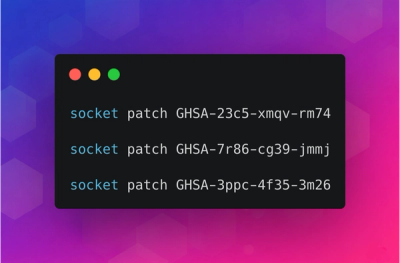
Security News
minimatch Patches 3 High-Severity ReDoS Vulnerabilities
minimatch patched three high-severity ReDoS vulnerabilities that can stall the Node.js event loop, and Socket has released free certified patches.
mysqldb-wrapper
Advanced tools
mysqldb_wrapper is a python module that will help you easily communicate with your database and provides encryption with Fernet using the cryptography module. This module is inspired by SQLAlchemy but is even simpler to use and has less limitations (but is also less complete).
IMPORTANT: This module is only made to use with simple mysql queries. You can still use it with more complex queries, but no interface is provided for those.
This module is available via pip:
pip install mysqldb_wrapper
First, you need to create a table. Here's an example:
from mysqldb_wrapper import Base, Id
class Test(Base):
__tablename__ = "test"
id = Id()
another_table_id = Id()
hashed = bytes()
number = int(1)
string = str("string")
boolean = bool(True)
To explain in details:
id = Id() is, as its name implies, the database object id. Always put one Id.another_table_id = Id() is the id of another table in the database.hashed = bytes() will be a hashed string, always declare it empty.number = int(1) will be a int with a default value 1.string = str("string") will be a string with a default value string.boolean = bool(True) will be a boolean with a default value boolean.Easy, right ?
Note: This implementation does not support complex types, so keep your table simple ;)
You need to create your database by hand Although this module will not create the database for you, it will create the tables automatically !
Note: keep in mind that if your table change (remove fields, change field types, ...), you will need to remove/update them by hand.
To initialize a session with the database, use:
from mysqldb_wrapper import Session
session = Session(DB_USERNAME, DB_PASSWORD, DB_TEST, FERNET_KEY)
So here we have:
DB_USERNAME is the username of the mysql userDB_PASSWORD is the password of the mysql userDB_TEST is the name of the databaseFERNET_KEY is the encryption key. You can create one with Fernet.generate_key(), but keep in mind to always use the same one. (So generate one by hand then keep it somewhere safe)And now we have all we need to use the mysql database.
Remember your table ? Just create a new object from it and use the add method of the session with it. Also, the table objects supports **kwargs.
obj = Test(hashed="abcd", string="word")
session.add(obj)
And obj now automatically contains the id generated by the database. Also, this method returns the object in case you want to chain methods.
Using the obj from before:
obj.number = 2553166
obj.string = "a sentence"
obj.boolean = True
session.update(obj)
This method also returns the object.
And again:
session.delete(obj)
obj now is not in the database anymore but you can still continue to use it, just remember it doesn't have an id (set to 0). Like the others, this method returns the object.
We have more to talk about in this section.
obj = session.query(Test).first()
This one is easy. You put the table you want in query() and you want to get the first result.
obj_list = session.query(Test).all()
Same than before, except this time you retrieve all the results. It is guaranteed to return a list, even if empty.
Now the tricky part:
obj = session.query(Test).where(Test.id == 2).first()
This time, we are still querying in the Test table, but we want a specific result, the one where the id is equal to 2. You don't have to worry about doing anything more, everything is handled by the Base class your Test table inherited from.
Remember we had a hash in our table ? Don't worry, it is handled as well. How does it work ? Like the others field. =)
obj = session.query(Test).where(Test.hashed == "abcd").first()
You can also chain the where methods, use variables and query all objects:
a_string = "something"
list_obj = session.query(Test).where(Test.another_table_id == 2).where(Test.hashed == a_string).all()
IMPORTANT: The where method only works with equality as of now. Also, you can only query by Id and hashes.
FAQs
A small package that wraps MySQLdb for easy usage and encryption
We found that mysqldb-wrapper demonstrated a healthy version release cadence and project activity because the last version was released less than a year ago. It has 1 open source maintainer collaborating on the project.
Did you know?

Socket for GitHub automatically highlights issues in each pull request and monitors the health of all your open source dependencies. Discover the contents of your packages and block harmful activity before you install or update your dependencies.

Security News
minimatch patched three high-severity ReDoS vulnerabilities that can stall the Node.js event loop, and Socket has released free certified patches.

Research
/Security News
Socket uncovered 26 malicious npm packages tied to North Korea's Contagious Interview campaign, retrieving a live 9-module infostealer and RAT from the adversary's C2.

Research
An impersonated golang.org/x/crypto clone exfiltrates passwords, executes a remote shell stager, and delivers a Rekoobe backdoor on Linux.